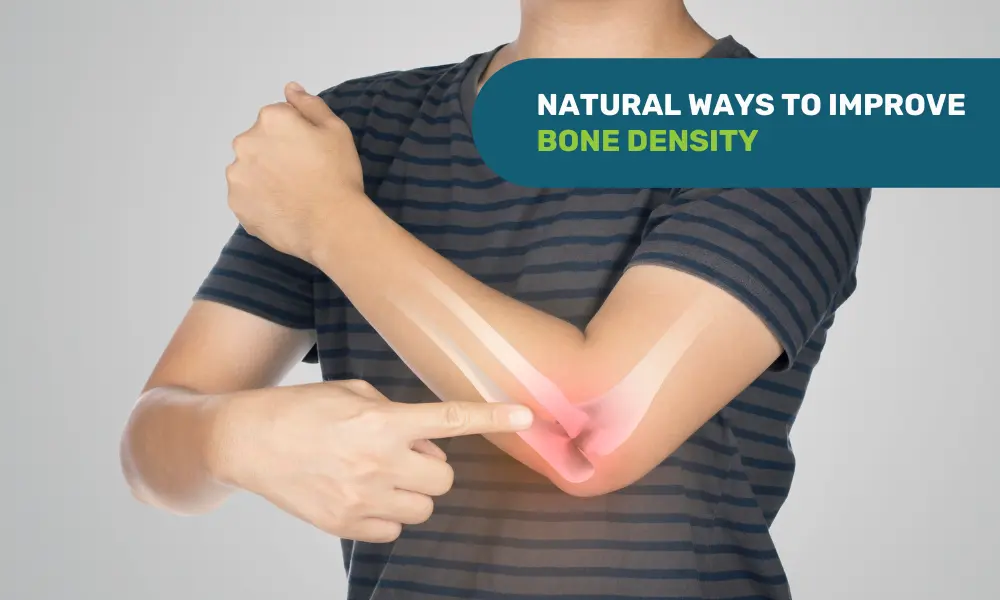Healthy bones are essential for a strong and healthy life. As we age, our bones lose strength and weaken, leading to joint and bone pain. This is because of the decreased bone density. A Low bone density can be dangerous for our health.
Table of Contents:
-
Bone Density
-
Why is low bone density dangerous?
-
Complications of Low Bone Density
-
Causes of Low Bone Density
-
Ways to improve bone density
Bone Density
Bone density is the amount of minerals in the bone tissues. Higher mineral content in our bones indicates stronger and denser bones. Lower bone density causes pain and increases the risk of fracture or osteoporosis, which causes bones to become weak and brittle. Certain lifestyle modifications, like strength training, dietary choices, weight control, and other lifestyle decisions, can help people increase their bone density.
Why is low bone density dangerous?
When individuals have low bone mass and continue to lose bone density, it may cause osteoporosis. Lower bone density increases the risk of fractures and broken bones.
Complications of Low Bone Density
-
Deformities and Fractures
-
Osteoporosis
-
Osteoarthritis
-
Bone cancer
Causes of Low Bone Density
Low bone density is caused by deficiencies in essential minerals such as calcium, magnesium, phosphorus, or vitamin D. Problems with the hormones that regulate our blood minerals may also cause low bone density. Sometimes, metabolic bone disease can be due to problems with the proteins and chemicals that make up the bones.
The following factors may cause lower bone density
-
Low physical activity
-
Poor diet, low in vitamins and calcium
-
Smoking
-
Drinking excessive amounts of alcohol
-
Ageing
-
Changes in hormones (from smoking or menopause)
-
Medical conditions like chronic kidney disease, rheumatoid arthritis, overactive parathyroid gland or celiac sprue
-
Certain medications like glucocorticoids or hormone blockers
Ways to improve bone density
It is essential to increase bone density before it is too late and starts causing problems. Bone density can be increased in various natural ways:
Providing good nutrition to the body: Calcium is one of the vital nutrients for strong and healthy bones. It is generally present in dairy products, seafood, and green vegetables. Along with calcium, Vitamin D also helps increase bone density. Exposure to sunlight is a natural way of acquiring Vitamin D, which helps increase bone density. Vitamin K is also an essential factor in bone health. By altering osteocalcin, a protein involved in bone production, vitamin K2 promotes bone health. It manages excess calcium deposits, promotes bone integrity, and helps heal wounds. One must, therefore, ensure to have a good diet that supports bone health.
Engaging in exercise: Strength training and weight-bearing exercise help to enhance bone density. Jogging, walking, and weightlifting promote bone formation and increase bone density. Strength training using resistance bands stresses bones and helps them build more robust and denser with time. These activities help improve bone mineral density, strength, and size.
Maintaining a good lifestyle: Maintaining good and healthy lifestyle practices helps keep the bones strong. What we eat and drink and how we practice certain activities determine our bone health. Substance abuse, such as smoking and drinking, leads to the weakening of bones. Not getting adequate sleep and improper sleep schedules also significantly affect bone strength. Proper rest, exercise, and good eating habits are necessary for strong bones. Drinking excessively aerated drinks also weakens the bones. They act as acids on the bones and result in their melting.
The Bottom line
Improving bone density naturally is the best way to achieve long-term effects and a healthy life. Weak bones lead to problems such as frequent fractures and osteoporosis. As we grow older, it is essential to look after our bones, as they form the structure that helps in the body’s overall movement. In case of frequent bone pain, one must consult a bone specialist.





